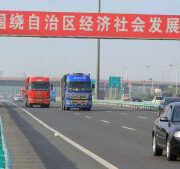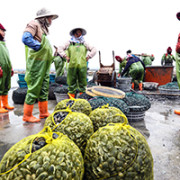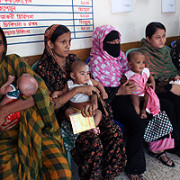Archive | Economics RSS feed for this section
Economics
 Economics
Economics
 Economics
Economics
 Economics
Economics
 Economics, Finance sector development
Economics, Finance sector development
 Economics, Regional cooperation and integration
Economics, Regional cooperation and integration
 Economics
Economics
 Economics
Economics
 Economics, Energy
Economics, Energy
 Economics
Economics

Global economic dynamics and Kazakhstan’s challenges in public financial management

As a highly globally integrated, resource-rich, upper-middle income country, Kazakhstan has been facing significant challenges in the current global environment. Kazakhstan’s major challenges include managing its public finances to preserve fiscal stability and generating broad-based economic growth.
Structural reforms to sustain Asia’s growth

Economic growth in both developing and advanced economies has slowed since the global financial crisis. Developing Asia’s growth also moderated after the crisis, to a large extent driven by the slowdown in the People’s Republic of China (PRC). The region’s economy expanded on average 7.6% annually during 2001–2010, but growth slowed to an annual average of 6.5% during 2011–2015. ADB is projecting further deceleration to 5.7% in each 2016 and 2017.
Impact of a possible growth slowdown of the People’s Republic of China on emerging Asia: A general equilibrium analysis

With its rapid economic growth and integration into the global economy over the last 3 decades, the People’s Republic of China (PRC) has emerged as a major economic power and an important source of growth for the world economy. Now it is the second-largest economy at market exchange rates and the largest exporter in the world. In Asia, the PRC’s role as a growth pole is even more prominent. Over the last 10 years, spurred by strong processing exports and domestic demand, the PRC’s imports from Asia in US dollar terms have increased at an average annual rate of 9%. Strong demand from the PRC also supported prices of commodities exported by Asian and other emerging economies.
Kuroda should rethink the quest for 2 percent inflation

The Bank of Japan had a difficult start into 2016. The latest data shows that inflation in the last quarter of 2015 was lower than expected. Furthermore, doubts are increasing about the recovery of the economy. At the end of January, BOJ Gov. Haruhiko Kuroda surprised markets by announcing negative interest rates for certain commercial bank deposits at the BOJ. On March 1 Japan started to sell government bonds with a yield below zero. Market observers expect even bolder steps later this year.
Budgeting data gaps and fiscal policy debate

Singapore has regularly reported considerable surpluses in its annual fiscal budget. Budget surpluses have been an essential part of the country’s growth strategy (Asher et al. 2015) as they are perceived to provide a signal of sound public sector financial management to foreign investors, key stakeholders in Singapore’s development planning. Budget surpluses also enable the corporate income tax rate to be kept among the lowest in the world, at 17%. Other policies—such as having a relatively large inflow of foreign workers that depresses at the lower end and almost no taxes on most forms of capital gains and domestic interest income—contribute to the high share of capital income in national income at around 55%, with labor’s share at around 40%–42%, in contrast to the pattern in OECD countries.
Learning from firms in East Asian production networks

Slowing growth in the Peoples Republic of China (PRC) – the world’s second largest economy – is grabbing the headlines with some suggesting a third wave of the 2008 global financial crisis. While this topic deserves attention because of its global economic implications, there is insufficient analysis of firms in global production networks (GPNs), which were at the forefront of the economic transformation in PRC and the rest of East Asia, and lessons for latecomers to GPNs.
The PRC’s growth prospects

The PRC’s diminished growth prospects have figured prominently in recent commentaries about global economic conditions and world stock markets (e.g. Frankel 2016). The general view, with which I concur, is that the PRC will grow in the future at a much slower rate than it has in recent decades. This growth slowdown will reduce international trade and has probably contributed already to the depression in oil prices (Blanchard 2016).
How to achieve inclusive growth? Income inequality and health in G20 countries

The G20 leader’s summit came to a close earlier this month in Istanbul, Turkey. The emphasis of Turkey’s G20 presidency this year is on “inclusive and robust global growth.” Turkey recognizes inequality as a major problem within countries as well as across national borders and stresses the need for reducing inequality in order to achieve mutual growth. In this article, I examine the relationship between income inequality and health among G20 countries. I find that as income inequality lessens, key health outcomes, such as child mortality and life expectancy, also improve substantially. This is an important finding that could provide guidance for ADB member economies in formulating their domestic policies to foster inclusive growth.
Do Japan’s oil consuming sectors still react to oil price movements?

Japan is almost fully dependent on energy imports. In March 2011, a devastating earthquake and tsunami hit eastern Japan and damaged the nuclear power plant in Fukushima. This disaster led to the shutdown of all nuclear power plants due to the lack of government safety approvals. Japan replaced this significant loss of nuclear power with energy generated from imported natural gas, low-sulfur crude oil, fuel oil, and coal.
PRC’s slowdown for Asia’s growth – key takeaways

After many decades of driving regional growth, the economy of the People’s Republic of China (PRC) is now slowing down, and this is likely going to have a noticeable effect on the world economy and especially globally integrated economies in developing Asia.


Search
Subscribe / Connect to Asia Pathways
Subjects
- Agriculture and natural resources
- Blog
- Capacity development
- Climate change
- Economics
- Education
- Energy
- Environment
- Finance sector development
- Gender
- Governance and public sector management
- Health
- Industry and trade
- Information and Communications Technology
- Infrastructure
- Miscellaneous
- Population
- Poverty
- Private sector development
- Regional cooperation and integration
- Sanitation
- Social development and protection
- Transport
- Uncategorized
- Urban development
- Video Blog
- Water
Recent Posts
- Navigating Linear Transport Infrastructure Through Conservation Landscapes
- How Are Technology Trends Shaping the Future of Insurance?
- Securing Asia’s Future Through Soil Health: Why It Matters and What Must Be Done
- Silent Struggles: Advancing Women’s Mobility with Public Transportation in Asia
- Mind Your Neighbors: Measuring Shrimp Farm Spillovers




Recent Comments